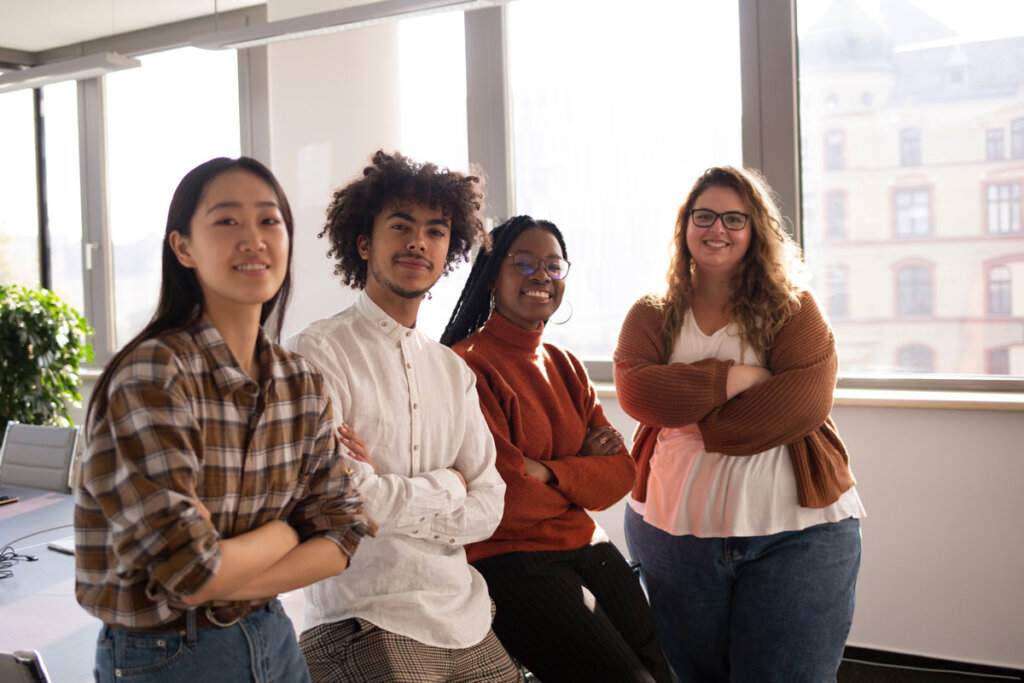At EdSystems, we not only advocate for racial equity and comprehensive learner preparation, we also embody these principles through our youth apprenticeship program. Through departmental rotations, college visits, career exploration, and independent projects, our team mentors youth apprentices, providing them with hands-on experience and essential employability skills to thrive in the world of education policy. With apprenticeships lasting up to three years and opportunities for full-time positions or connections to other organizations upon completion, we are invested in empowering the next generation of education policy leaders while advancing our mission.
The launch of the youth apprenticeship program this year has been full of learnings and successes as the team grapples with what a high-quality experience is for students and our organization. While we have accomplished a lot this year and were privileged to learn and collaborate alongside our youth apprentices, we recognize that we have room for improvement to enhance the experience. Here’s a look at our learnings, what our youth apprentices have been up to this past year, and how we are looking ahead to refine our youth apprenticeship and enhance our role as mentors for young people.
What Did We Learn?
As we reflect on our experiences with our youth apprenticeship program, a few key learnings have emerged:
Education Policy Is Tricky to Explain to Students
We’ve recognized the challenge of recruiting students for roles within education policy and the need to be more student-friendly in our language and how we explain our work to peak student interest.
Establishing a Main Point of Contact Within Our Team Has Proven Crucial
Identifying a single team member to effectively coordinate with apprentices and manage the logistics of department rotations has been helpful so the team can focus on mentorship and building a relationship with apprentices.
Team Members Need Support Developing Tasks and Projects
Collaborative conversations with team members to navigate their questions and provide thought partnership are key to finding projects that are the right fit for youth apprentices and are aligned with team members’ skills and subject matter expertise.
As we continue to refine and improve our youth apprenticeship program, we are also thinking more intentionally about mentorship. What does it mean to be a mentor at EdSystems? What collective and individual supports and resources does our team need to be a mentor?
What Did Youth Apprentices Do?
This year, our youth apprentices, Emily Won and Maritza Ortega, engaged in a variety of projects where they provided expertise and insights based on their experiences.
Emily Won: Author and Advisory Member
In our latest initiative, EdSystems brought together stakeholders from diverse backgrounds to establish robust criteria for work-based learning rooted in state frameworks and definitions. As part of this endeavor, Emily assumed a pivotal role, gathering invaluable student insights that she shared with the advisory committee to guide conversations. Emily served as a contributing author of the high-quality criteria resource document by crafting accessible student-facing “I can” statements to complement the established criteria, which she vetted with her peers. Through active participation in both advisory meetings and in developing the resource, Emily gained hands-on experience while amplifying the student voice in decision-making processes, ultimately enhancing the quality and relevance of the criteria developed.
Maritza Ortega: Curriculum Reviewer
In partnership with Illinois communities, EdSystems spearheaded the development of the GPEAK, a comprehensive system that integrates curricular resources, assessments, and badges aligned with Illinois’ ten essential employability skills. As an integral part of this project, Maritza has played a vital role by offering feedback on the curricular resources and is currently finalizing a summary of recommendations for improvement. These insights will be shared with communities across Illinois that are utilizing GPEAK to ensure continuous refinement and enhancement of the GPEAK system to better serve learners statewide.
What’s Next?
We look forward to continuing our youth apprenticeship program and are excited to introduce our next youth apprentice soon! As we look ahead to year two of our youth apprenticeship program, we are grappling with a few questions as we strive for improvement and effectiveness:
- With apprentices often transitioning to four-year colleges outside of Chicago, how can we maintain engagement remotely while honoring their new academic endeavors?
- How can we be more intentional in targeting our recruitment efforts to attract a diverse and dynamic pool of applicants?
- What does a portfolio look like for youth apprentices to showcase their reflections and evidence of essential and technical skills acquired?
These questions serve as important points for discussion in our ongoing efforts to enhance our program’s impact and sustainability We remain committed to finding innovative solutions that best serve the needs of our youth apprentices and our organization.
Interested in Developing a Youth Apprenticeship Program?
We are here to connect as thought partners and a resource for what a youth apprenticeship program could look like in your organization! A youth apprenticeship is a high-quality way for your organization to:
- Directly engage with young people on subjects and areas pertinent to your organization.
- Involve young people in decision-making processes related to education policy or advocacy.
- Provide one-on-one mentorship for young people over an extended period of time.
Start small with one apprentice! To connect about what it takes to host a youth apprentice, please contact EdSystems.



